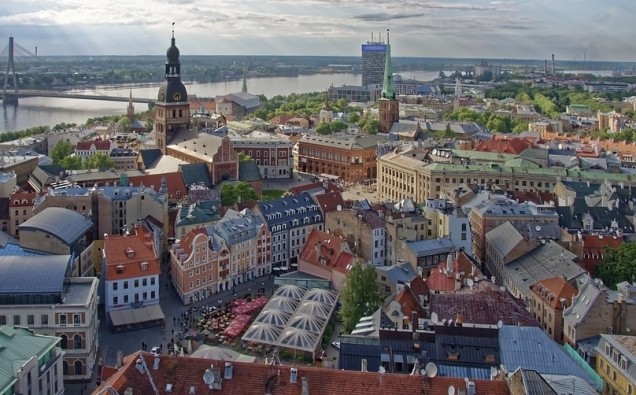Image of the Baltic countries, same like of all other post-Soviet states, is still being seen under the shadows of dark past. However, it’s a wrong stigma that should be left behind right away.
Let’s talk restaurants this time. According to Tablein, an online reservation service in the region, field’s gloomy days are long gone. Foodie sector is evolving at a rapid pace: new bars, pubs, restaurants, eateries and other places from this segment are opening each day. Let it be Lithuanian capital Vilnius, Latvian capital Riga or Estonian capital Tallinn, all three cities can easily offer the gourmet experience at the decent global level.
Game-changing statistics
Let’s take a look at the picture from the demographic point of view. According to national statistical bureaus in different countries, situation in the Baltic states is quite mind-blowing game-changer.
What is the approximate number of restaurants, bars, cafeterias or other types of eateries per 100.000 of the population in each capital city? According to local statistical bureaus, Vilnius has 221, Tallinn – 228. Riga – slightly more than the neighbours. Let’s make a comparison. London has around 442. That’s logical to have more in the so-called capital of Europe. But what about, let’s say Sweden, Netherlands, Ireland or Spain? Stockholm has a bit over 100, Amsterdam – around 122, Madrid – approximately 141, and Dublin – 32. Way much less than in Vilnius, Riga or Tallinn. So, what’s the new foodie paradise in Europe? Seems that capitals of Baltic countries might easily become one!
Choices can please every food enthusiast
The variety of options in Vilnius, Riga and Tallinn is significant. Venues offering menus inspired by local traditions and well-known Italian, French, Spanish or Japanese cuisines are present. However, there is no need to travel abroad if one is craving for more unique tastes. All three capitals overwhelm with a decent number of places, offering African, Caribbean, Peruvian, Nikkei, Nepali, Indonesian, Korean, you name it, foodie experience. “Think of any cuisine, and I can assure that there will be a place which serves its particular food“ – Eglė Čekauskaitė, Product Manager at Tablein, spoke about choices available in capitals of the Baltic states.
Gourmet experiences are going foot to foot with global tendencies. Restaurants are not afraid of improvisations, which tend to be warmly welcomed by open-minded local diners. Places vary from chefs’ restaurants, trendy food halls, hip tap-rooms as well as fancy pop-up courts, to exclusive fine dining venues and conceptual one-table-single-dish spots. “Nowadays, both the supply and demand are correlating in perfect harmony. People in Baltics are hungry not only for food but for the experience too, so each novelty is accepted with great interest, curiosity and sense of loyalty. They love having Monday breakfast out for a cosy start of a new week, have gourmet business lunch, savour the dinner with friends and enjoy Sunday family brunch. Gladly, all three capitals can offer plenty of places to fulfil any foodie desire,” said Tablein delegate.
Exclusivity and once-in-a-lifetime experience is in demand
Quality goes first as the diners care about it like never before. Thus, the choice of local, organic and seasonal farm-to-table products over the wholesale one is increasing noticeably. Sustainability is in mind. At the same time, catering places become more and more mindful about plastic use. Vegetarian, as well as vegan, options are on the great go too.
Random menus rarely can work, so the gourmet scene of Baltics is filled with thought-of selections. All three capitals show the noticeable tendency of getting back to the roots and local gastronomic traditions. Chefs analyse the old recipe books and recreate the tastes that were once served on the tables of royal ancestors.
More and more restaurants tend to focus on not only feeding the hungry ones but creating the whole experience. Whether it is a breathtaking interior design solution, Instagram worthy food presentation in plates or tasting menus introduced by chef himself, everything is available in Baltics.
Habits of diners are in significant change either
Habits of diners in all three capitals are noticeably changing too. One of the newest developed traditions is to book a table in advance. If this is a regular practice in London, Paris or New York, it was never a big case in Baltics. Even five years ago you could come to the restaurant in Vilnius, Riga or Tallinn, and almost always get a table. As the life is on the rush, the world is running on a busy Western pace and foodie cult is rising, people tend to plan their time and be sure to get a table in the preferred restaurant. The most popular way to reserve a table online is via local Tablein websites.
What do Michelin and White guides say?
Many may consider the Michelin guide as Gastronomic Bible, but neither Lithuania, nor Latvia or Estonia have been featured there yet. However, if a country is not on this exclusive list, that doesn’t mean that it has no restaurants worth the stars.
This guide covers several dozens of countries around the globe only. Michelin inspectors leave out not only the ex-Soviet block countries, including the Baltic states, but Canada, Australia or the UAE too. Thus, for those looking from a wider perspective, it is quite obvious that this guide cannot be taken as the ultimate adviser.
The most respectful gastronomy and restaurant guide in the Nordics is the White Guide. Gladly all three capitals – Vilnius, Riga and Tallinn – are on the list with their exceptional restaurants awarded by experts. It’s a pride to appear next to the precision of Copenhagen, Stockholm or Reykjavik.
Success lies down under the courage and diligence
“Businesses in Baltic countries don’t take anything for granted. We work hard and try to do only our best. There’s no room for fears. Our standards are high: we won’t even bother going further, if we don’t think of creating the best. This might be associated with past times, when chances to create something own were equal to zero. As the spectrum of possibilities evolved, so did our appetite for perfection,” Eglė Čekauskaitė shared the thoughts of the successful restaurant business expansion in the Baltic countries.















